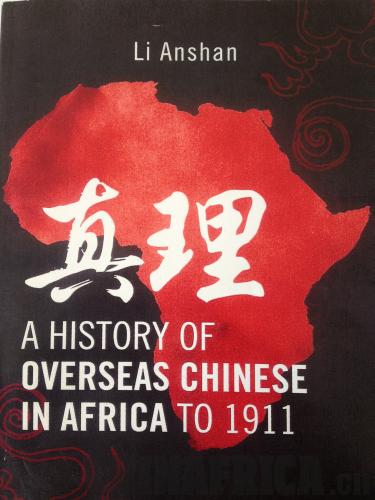|
 |
|
A History of Overseas Chinese in Africa to 1911 by Li Anshan |
China-Africa relations have been a hot topic in international relations since the beginning of the 21st century. Some observers believe that China is playing a positive role in African development, while others complain that China is scrambling to monopolize African resources. Li Anshan's A History of Overseas Chinese in Africa to 1911 answers some questions about China's current role in Africa by providing historical context for today's issues, and giving readers an in-depth picture of historic China-Africa connections.
Published by the Diasporic Africa Press (New York), A History of Overseas Chinese in Africa to 1911 makes excellent use of detailed source materials in supporting its conclusions. These materials include articles from old newspapers, archival sources, governmental documents, biographies, yearbooks, articles from more recent magazines and books and research findings from the author's own academic visits and travels to Africa. The author's presentation of these materials demonstrates careful analysis, and they are sorted for the reader's convenience. For example, the foreign official files concerning Chinese living in Africa are divided into unpublished, published and local official documents. And on the basis of these materials,the book itself is split into four parts: the Development of Early Sino-African Relations, the Beginning of Overseas Chinese; the Establishment of Overseas Chinese Communities and Oppression, Discrimination, and Protest.
This is the first work to comprehensively study the history of overseas Chinese in Africa. Although there had been some research done on overseas Chinese before Li's work, most of it has focused on overseas Chinese in specific countries or regions, such as Southeast Asia, South Africa, Madagascar, Mauritius, La Reunion, Seychelles and Mozambique. Yet no single work had focused entirely on the study of overseas Chinese in Africa.
Although the book only covers events up to 1911 (the Chinese edition of the book was published early in 2000, and as a result the research was completed before 1999), this does not discount its great academic contribution to the study of overseas Chinese in Africa by Chinese scholars. The work covers two crucial topics: the origins of overseas Chinese in Africa, and the establishment of Chinese communities in Africa. These two topics explain how Chinese people came to Africa during the period ranging from 1700 to 1904, how they settled in the continent and what they did there. The book describes how Chinese people in Africa traveled and resided in East Africa, Southern Africa, Central Africa, West Africa and even North Africa. These examples, especially Zheng He's expedition to Africa in 1409-11, show that connections between China and Africa originated much earlier than those between Africa and the West. Considering the lack of comprehensive studies in this area, both in and outside China, Li's work does a great deal to fill in historical gaps.
Li's book has also laid a historical foundation for people wishing to understand the linkages between China and Africa and their similarities after Western colonization. Apart from a small number of the Chinese doing business in Africa from 1700 to 1911, most were imported to Africa as "indentured laborers" by British and French colonists in Africa in the mid-18th century. As Li noted, "The Chinese were abducted through various means and sent to the European powers' African colonies to work as coolies." At the time it was in fact illegal for Westerners to recruit Chinese workers to work in Africa, and "the working conditions and compensation were far from what was promised by the employers." (p.61) Harsh economic and political oppression coupled with racial discrimination finally led to protests by the Chinese (Chapter IV).
Li's work shows readers that China is not a "newcomer" in Africa. China's presence there is different from that of Western countries because China's early explorations in Africa were not for the purposes of occupation or colonization, but fostered peaceful trade and cultural exchange (a prime example being Zheng He's voyage). Li's book records this positive history and China and Africa's similar historical experiences with the West, giving insight into the flourishing trade between China and Africa today. |